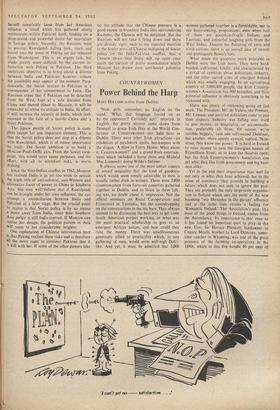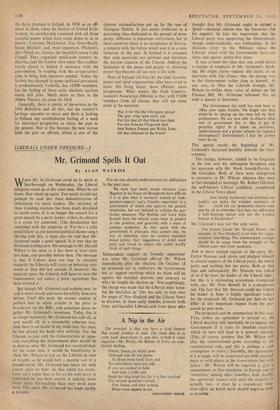COUNTRYWOMEN
Power Behind the Harp
MARY HOLLAND writes from entblin: 'Now, girls, remember, no English on the stand.' `What, that language forced on us by the oppressor? Certainly not!' retorted, in English, the pretty weaver come down from Donegal to grace Irish Day at the World Con- ference of Countrywomen just held here in Dublin. There were other Irish attractions—an exhibition of patchwork quilts, bee-keepers with' the slogan. 'A Hive in Every Home: What. abbut it, Countrywomen?' and a grand Irish entertain- ment which included a horse show and Mich6a1 Mac Liamm6ir doing Wilde's Salome.
It always seems one of the most unfair aspects of sexual inequality that the kind of goodness which Would seem simply admirable in men is usually rather drab in women. There were 3,000 .countrywomen from forty-six countries gathered. together in Dublin, and to listen to them talk- ing was, no doubt about it, impressive. Not the official seminars on Rural -Co-operation and Economics in Tanzania. but the eavesdropping on the conversations, in the tea bars. They always seemed to be discussing the best way to get some South American project working, or what was the most practical scholarship to give to an emergent 'African nation, and how could they raise the money'. There was unselfconscious generosity allied to practicality which, in any gathering of men, would seem well-nigh Dolci- like. And :yet, it must be admitted that 3,000
women gathered together is a formidable, not to say heart-sinking, proposition: even when half of them are porcelain-fragile Indians and Laotians, and colourful laughing girls from the West Indies. Despite the fluttering of saris and vivid cottons, there is an overall idea of tweeds and grotesquely flowery hats.
What made the goodness more palatable in Dublin were the Irish hosts. They were hard- headed, cultivated, kindly, and characterised by a streak of cynicism about politicians, industry, and the other sacred cows of emergent Ireland which was wholly engaging. In an agricultural country of 3,000,000 people, the Irish Country- women's Association has 500 branches, and tHeir potential influence is obviously something to be reckoned with.
There was plenty of reckoning going on last week. The President. Mr. de Valera, the Premier, Mr. Lemass. and assorted politicians came to pay their respects. Industry was falling over itself to give money, or hospitality, or accommoda- tion, preferably all three. 'Of course, we're terrible beggars,' said one soft-voiced Dubliner, but another, n'tore openly cynical, replied, 'Non- sense, they know our power.' It is hard in Ireland to• raise money to save the Georgian houses of Fitzwilliam Street, Qr to keep the theatres open; but the Irish Countrywomen's Association can get what they like from government and big busi-
ness alike. '
Yet in the end their importance may well lie not only in what they have achieved, but in the sense of continuity they provide in building a future which does not seek to ignOre the past. They are probably the only large-scale orsanisa- tion in Ireland which sees the point of the new booming 'two Mercedes in the garage' affluence and' at.. the same lime retains a feeling for 'Romantic Ireland.' The Association's past, like most of 'the good things in Ireland, comes from the Ascendancy.- Its importance 'is that even-So it has found' an 'important ..part to play-in the new Eire. Sir' Horace Plunkett, landowner . in County Meath, brother to Lord DtInsany, some- time rancher in Wyoming, was one of the great pioneers of the farming co-operatives in the 1890s, which to this day handle 80 per cent of 'it can't get no — satisfaction . . the dairy produce in Ireland. In 1910, as an off- shoot to them, came the Society of United Irish- women, its membership crammed with all those graceful names which have come down to us in poetry—Countess Markievicz, Eva Gore-Booth, Susan Mitchell. and, most important, Plunkett's dear friend ant; hostess, the beautiful young Lady Fingall. They organised small-scale country in- dustries, kept the Society alive when 'the troubles' nearly closed it, helped if necessary with the gun-running 'in keeping with the co-operatives' aims to bring help wherever needed. Today the Society has changed its name (political pressures), is predominantly Catholic, has 15,000 members, but _the feeling of those early idealistic patriots seems still alive. Much more so than in the Abbey Theatre, let alone the Dail.
Generally, there is plenty of lip-service to the 1916 Rebellion and all that, but the country's heritage amounts to more and there is lacking in Ireland any establishment feeling of a need for historical perspective to relate the past to the present. Nor is this because the new nation finds the past an affront, which is one of the cleverer rationalisations put up for the rape of Georgian Dublin. It just seems irrelevant to a governing class dedicated to the pursuit of pros- perity. Affluence is important everywhere, but in most countries there is an acceptance of history, a concern with the future which sees it as a con- tinuation of the past. In Ireland it is assumed that such questions are spiritual and therefore the narrow concern of the Church. Adding the halfpence to the pence and prayer to shivering prayer has become all too easy a life style.
Most of Ireland still lives by the land. Govern- ments and rural organisations alike have tried to make this living easier, more efficient, more prosperous. What makes the Irish Country- women's Association different is that, with 15,000 members from all classes, they still see some point in the question :
Was it for this the wild geese spread The grey wing upon every tide; For this that all that blood was shed, For this Edward Fitzgerald died. And Robert Emmet and Wolfe Tone, All that delirium of the brave?



































 Previous page
Previous page